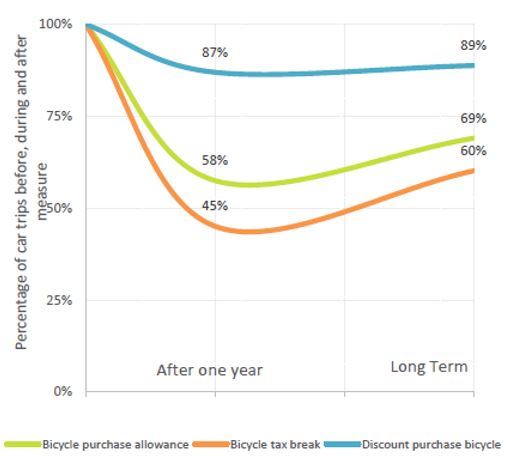Promoting cycling among your employees
published: 12-02-2021
Interested on knowing more about the positive long-term effects of promoting cycling among your employees? Or of the impacts of government tax benefits for buying a bike? Have a look to the report prepared by out sister company MuConsult and their result of their last 7 years of research for Zuid-Limburg in the Netherlands.
Effects of Mobility Measures in Mobility Management
In 2020 MuConsult conducted the 10th Clustered Impact Assessment for South Limburg Bereikbaar to monitor the effects of the employer approach. Within the framework of this jubilee edition of the Impact Assessment, they carried out additional analyses into the long term effects of mobility management. The analyses show that participants in bicycle and public transport measures still maintain their new behaviour several years after participation. Behavioural retention is highest among participants who have switched to bicycles or e bikes. The data for 2020 has been adjusted for Corona effects. However, it is possible that the crisis may have longer term structural effects on, for example, the attractiveness of working from home and the use of public transport. This will have to be demonstrated in future similar analyses.
The Impact Assessment is an annual survey among commuters of affiliated covenant partners of Zuid Limburg Bereikbaar (formerly Maastricht Bereikbaar). The effects of the following measures were evaluated:
- Mapping commuters' mobility behaviour and car ownership and changes therein;
- Explain changes using measures of Zuid Limburg Bereikbaar, measures of the employers themselves, other measures and autonomous developments.
- Translation of the behavioural change attributable to the programme into car avoidance, CO2 reduction and intensity reduction on priority corridors.
- Factsheets for companies for further measures for smart and sustainable mobility.
- Input for Monitoring & Evaluation of the total programme for the purpose of monitoring, adjustment and accountability.
The research shows different results. Bicycle promotions ensure a reduction of 24% car trips per week among the participants. After a few years this drops to 19%. Public transport actions lead to 8% fewer car trips per week. After a few years, this drops to 6%. Car plans and flexible travel allowances increase the number of car trips per week for participants. An increase of 30% in the short term - over 24% in the long term.
This report concludes that commuters who switch to bicycle, e-bike or public transport as a result of campaigns by Zuid-Limburg Bereikbaar or the policy of the employer will continue to do so for a longer period of time. The long term effect of mobility management is a reduction of 6% to 19% in the number of commutes (home-work) per week among the group of participants of the action(s). It is precisely during the crisis that many commuters and employers reconsider their mobility options. An extra effort on desired changes is likely to be effective right now.
